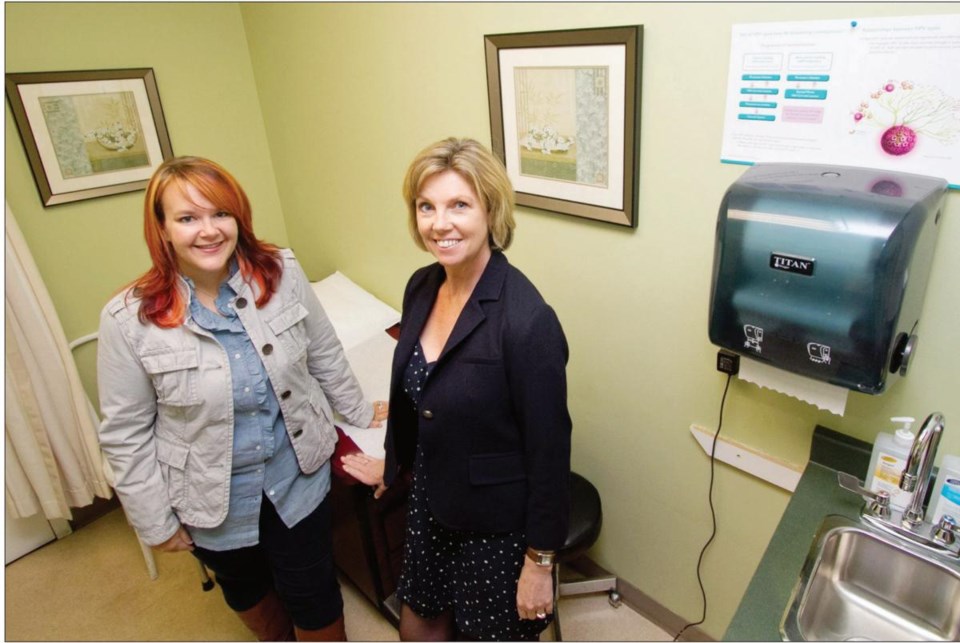When Victoria marketing manager Sue Dakers last visited her sister in England in 2010, their chats turned personal and Dakers admitted she hadnt been taking care of her health. Specifically, for five years, she had avoided having pelvic examinations that could detect the changes that lead to cervical cancer.Her astounded sister made Dakers promise to have a cervical screening test as soon as she got back to B.C. Which was profoundly fortunate.It turned out that there was something that needed to be addressed urgently, Dakers, 50, recalls. It was pre-cancerous but it was very close to cervical cancer. It was an ironic turn of events, because Dakers had always found the most terrifying part of a Pap appointment was not discomfort or embarrassment but the spectre of a call back from a medical office about an abnormality. And thats the thing the longer you leave it, the more terrified you get.She was so grateful for a sister who encouraged her to face her fears, but worried about other women with no one to turn to for support. The result: Screening Sisters, a volunteer peer support group. It launches this week following more than a year of liaison with the Canadian Cancer Society, B.C. Cancer Agency and Island Sexual Health.With the help of about eight members of Dakerss social circle, a woman will be assigned a companion to support her at appointments for a cervical screening test, getting the results or for phone conversations between appointments which can be several stressful weeks or even longer, she said.Its a phenomenal program, says Jennifer Gibson, the co-ordinator of educational services for Island Sexual Health. Many women who develop cervical cancer havent had regular cervical screening not all, but many.In fact, 14 per cent of Canadian women have never been screened and one in three havent been screened in the previous three years, even though Pap tests depend on detecting changes in cervical cells over time, the Public Health Agency of Canada warned in 2010.For young women, dread of the test has not gone the way of some other old wives tales. Recently, Gibson spoke to a group of teens heading out of town for university and the uniform reaction to having a Pap test was: No, ew, and I dont want it, she says.But when she brought out a plastic pelvis to show them what it entails, they were all keen to look at what the inside of their bodies look like.Breaking through that fear and having support thats where something like Screening Sisters comes in. When people dread something, they tend to avoid it, sometimes with tragic results. In 2009, there were 171 new cases of invasive cervical cancer in B.C. and 33 deaths, according to the B.C. Cancer Agency.Given the current level of screening, its estimated that two cases are prevented for every case diagnosed, the B.C. Cancer Agency reports. Even women with a friend or relative who would happily accompany them may feel more comfortable with a supportive stranger, Gibson said, since it can be hard to say: I need someone to come with me.To make the process less intimidating, Gibson uses terminology such as screening rather than Pap smear and foot rests rather than stirrups. She also encourages women to give themselves enough time to relax for the appointment that for some underscores a power imbalance position with the practitioner.Guidelines for the College of Physicians and Surgeons of B.C. state that if a patient requests a support person in the room for intimate exams, the request must be honoured. So-called chaperones in the room are not mandatory, but could add to a patients feeling of comfort and security, the guidelines state.Women do not have to be having intercourse to require a Pap test, she said. Even skin-to-skin touching in the genital area can spread Human Papillomavirus and two or three strains of that lead to almost all cervical cancers. Even HPV vaccines cannot prevent cancers that Pap screening can detect, the B.C. Cancer Agency notes.To get women to those appointments, Dakers has paid the cost of printing Screening Sisters brochures herself and would distribute them more widely if she could access funding.If this is successful, Id like to roll it out everywhere, basically. Not just in Victoria. Its so important to me because I know what its like. Our gut [feeling] is there are a lot of women out there who are scared. For more information, call 250-661-4413 or 250-478-2477.kdedyna@timescolonist.com



